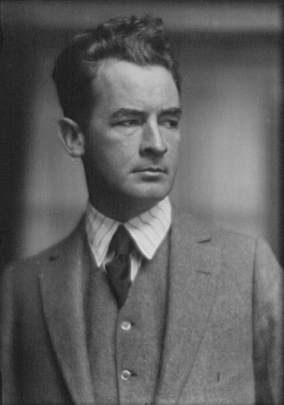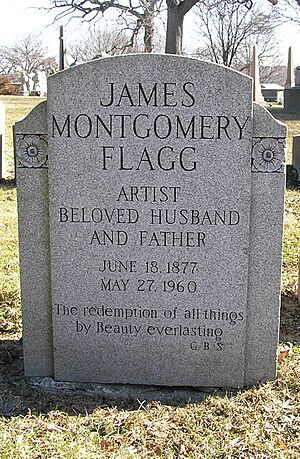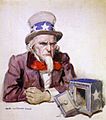James Montgomery Flagg facts for kids
Quick facts for kids
James Montgomery Flagg
|
|
|---|---|

James Montgomery Flagg, 1915, photographed by Arnold Genthe
|
|
| Born | June 18, 1877 Pelham, New York, U.S.
|
| Died | May 27, 1960 (aged 82) New York City, U.S.
|
| Nationality | American |
| Occupation | artist and illustrator |
James Montgomery Flagg (born June 18, 1877 – died May 27, 1960) was a famous American artist. He was known for his paintings, cartoons, and especially his posters. Many people remember him best for his powerful political posters, like the famous "I Want YOU for U.S. Army" poster.
Contents
Life and Art Career
Early Life and Drawing Talent
James Montgomery Flagg was born in Pelham, New York, on June 18, 1877. He loved to draw from a very young age. By the time he was 12, his drawings were already being published in national magazines. When he was 14, he became an artist for Life magazine. The next year, he joined the team at another magazine called Judge.
Art Studies and Illustrations
From 1894 to 1898, James studied art at the Art Students League of New York. He then traveled to London and Paris to study fine art from 1898 to 1900. After returning to the United States, he became a very busy artist. He created many illustrations for books, magazine covers, and even humorous cartoons. He also drew pictures for advertisements. One of his creations was a comic strip called Nervy Nat, which appeared regularly in Judge magazine.
The Famous Uncle Sam Poster
In 1917, James Montgomery Flagg created his most famous artwork. It was a poster designed to encourage people to join the United States Army during World War I. The poster showed Uncle Sam pointing directly at the viewer. Below him were the words, “I Want YOU for U.S. Army”. This idea was inspired by a similar British poster featuring Lord Kitchener.
Flagg first drew this image for a magazine cover in 1916. Over four million copies of the Uncle Sam poster were printed during World War I. It became so popular that it was used again during World War II. Flagg later said he used his own face as the model for Uncle Sam. He added age and a white goatee to his own features. He did this to save time and avoid finding a model. President Franklin D. Roosevelt even praised Flagg for being so clever!
A Successful Illustrator
At the height of his career, James Montgomery Flagg was one of the highest-paid magazine illustrators in America. He worked for popular magazines like Saturday Evening Post and Collier's. In 1946, he wrote a book about his life called Roses and Buckshot.
Besides his illustrations, Flagg also painted portraits of famous people. His portraits showed the influence of another great artist, John Singer Sargent. Flagg painted portraits of people like Mark Twain and Ethel Barrymore. His painting of boxer Jack Dempsey is now in the National Portrait Gallery.
James Montgomery Flagg passed away on May 27, 1960, in New York City. He was buried in Woodlawn Cemetery.
Legacy and Recognition
Honoring His Contributions
James Montgomery Flagg's work is still remembered today. At Fort Knox, a military base in Kentucky, there is a parade field named in his honor. It is called Flagg Field and is located behind the Fort Knox Hotel. Fort Knox is also where the U.S. Army Recruiting Command is located, which makes the field's name very fitting.
Historic Home
Flagg spent his summers in Biddeford Pool, Maine. His home there, known as the James Montgomery Flagg House, was added to the National Register of Historic Places in 1980. This means it is recognized as an important historical place.
Gallery
-
President McKinley, illustration in Vanity Fair magazine, 1899
-
The Smart Set (Magazine cover) 1911
-
Flagg's famous Uncle Sam recruitment poster
-
Uncle Sam Boys and Girls! 1917 war poster
-
Uncle Sam with empty Treasury
-
Columbia urges planting victory gardens
-
The Navy Needs You! Don't Read American History, Make It!
-
Wake Up America, Civilization Calls Every Man Woman and Child!
-
Together We Win
(World War I) -
World War II US Army poster showing Uncle Sam holding spanner. Presumably released between VE day and VJ day.
Images for kids
-
Flagg as Captain Kidd at the Illustrators' Ball, a masquerade ball in New York in 1917.
-
Flagg's famous Uncle Sam recruitment poster (c. 1917)
See also
 In Spanish: James Montgomery Flagg para niños
In Spanish: James Montgomery Flagg para niños
 | John T. Biggers |
 | Thomas Blackshear |
 | Mark Bradford |
 | Beverly Buchanan |



















